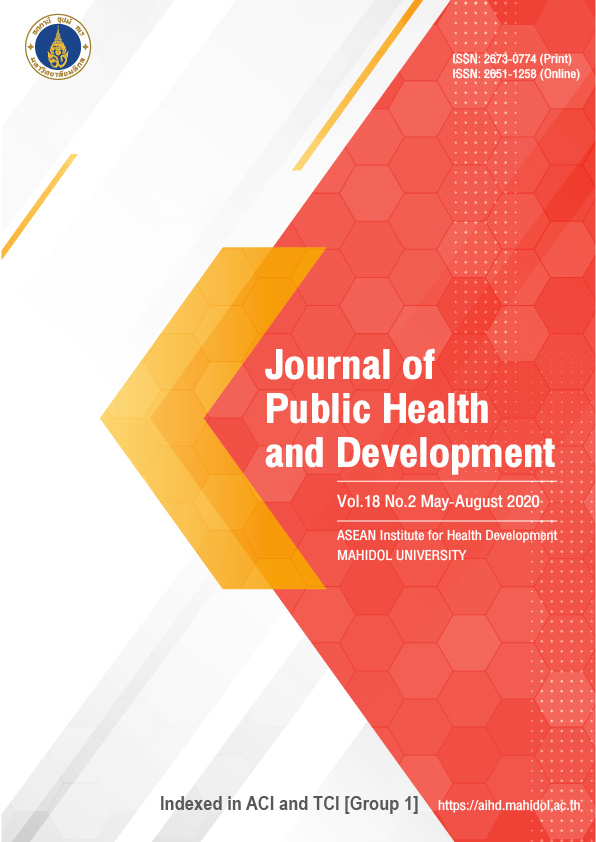Engagement of the District Health Board in Providing Preventive Measures for Chronic Kidney Disease Care in Thailand: The Perspective of a Multi-Disciplinary Team
Main Article Content
Abstract
Background: Promoting multi-sectoral collaboration to reduce the burden caused by non-communicable diseases (NCDs) has been a challenge to the global community as the policies of the non-health sectors also affect the determinants and risk factors for NCDs. In 2018, the Thai government introduced a new plan to reform District Health Boards (DHB) by encouraging collaboration between the health and non-health sectors at district level to promote health and well-being. Therefore, this study aims to explore the governance mechanisms of the reformed DHB and its contribution to the prevention and control of NCDs.
Method: This study employed several approaches mainly focusing on using a qualitative process to evaluate the program in four piloted districts. Focus group discussion was used to collect data from four groups of key informants including the DHBs, multi-disciplinary teams, community bodies, and diabetic/hypertensive patients with CKD stage 1-2. Thematic analysis was employed for data analysis.
Results: DHB committees consisted of members of public, private, and civil society sectors with the District Chief as the chairperson of the DHB and the District Public Health Officer (DPHO) as the secretary to the board. The roles of DHB members who were non-health sector focused more on addressing the social and environmental factors related to NCDs. The situation of NCDs in the district was shared and discussed at the DHB quarterly meeting and public hearing to enable community in health priority setting.
Conclusion: Although the concept of expanded chronic care model and health of all policies should be related to the rationale behind the movements of the DHB, it remains unclear as to whether the movements under the optimal authorities of the DHB will only affect the area close to clinical practices. To our knowledge, this is the first study in the WHIO South-East Asia Region revealing a promising multi-sectoral NCD prevention and control model. More studies are needed prior to scaling up the model for wider application in the region.
Article Details
References
Ackland M, Choi BCK, Puska P. Rethinking the terms non-communicable disease and chronic disease. J Epidemiol Community Health. 2003;57:838-839
WHO. Global status report on noncommunicable diseases 2014. Geneva: World Health Organization. 2014
WHO. Noncommunicable diseases: key facts [Internet]. updated 2018 Jun 1 2019 Jun 13. Available from: https://www.who. int/news-room/fact-sheets/detail/noncommunicable-diseases
Ingsathit A, Thakkinstian A, Chaiprasert A, Sangthawan P, Gojaseni P, Kiattisunthorn K, et al. Prevalence and risk factors of chronic kidney disease in the Thai adult population: Thai SEEK study. Nephrol Dial Transplant 2010;25(5):1567-75.
Nephrology Society of Thailand. Thailand renal replacement therapy 2015 (in Thai) [Internet]. updated 2015 [cited on 2019 Jul 10]. Available from: http://www.nephrothai.org/images/ Final_TRT_report_2015_%E0%B8%89%E0%B8%9A%E0%B8%9A%E0%B9%81%E0%B8%81%E0%B9%84%E0%B8%82.pdf
International Health Policy Program. Years of lifes loss: a report on burden of diseases and injuries of Thai people B.E. 2557 (in Thai). The Graphico Systems: Nonthaburi. 2017
Hfocus. The management of national health security fund B.E. 2563 (in Thai) [Internet]. [cited on 2019 Jul 10]. Available from: https://www.hfocus. org/content/2019/08/17592
Leesmidt V, Suwatthanarak S, Phromnim S, Punruenothai S. A study for delaying kidney detrioration of chronic kidney disease patients: from research to practice (in Thai). J Health Sci. 2017;26(1):112-24.
Jiamjarasrangsri V. Chronic care model (in Thai). Journal of Health Systems Research. 2008;2(1):82-90.
Pattanamongkol O, Chantaracha D, Chalongsuk R, Pongchaidecha M, Rungprai D, Muongmee S. Cost-effectiveness of The cost-effectiveness of pharmaceutical care to slow progression of the kidney in chronic kidney disease with diabetes patients at Laem Chabang hospital, Chonburi province (in Thai). TJPS. 2018;13(1): 53-67.
Barr V, Robinson S, Marin-Link B, Underhill L, Dotts A, Ravensdale D, et al. The Expanded Chronic Care Model: An Integration of Concepts and Strategies from Population Health Promotion and the Chronic Care Model. Healthcare Quarterly. 2003;7(1):73-82.
Epping-Jordan JE. Improving the quality of health care for chronic conditions. Qual Saf Health Care. 2004;13(4):299-305.
Dijkstra RF, Niessen LW, Braspenning JC, Adang E, Grol RT. Patient-centred and professional-directed imple-mentation strategies for diabetes guidelines: a cluster-randomized trial-based cost-effectiveness analysis. Diabet Med. 2006;23(2):164-70.
WHO. Milestone in Health Promotion: Statements from Global Conferences. WHO Press. 2009.
WHO. Health in all policies: Helsinki statement. Framework for country action. WHO Press. 2014.
Shankardass K, Muntanes C Kokkinen L, Shahidi VF, Freiler A, Oneka G, Bayouni AM O'campo P. The implementation of Health in All Policies initiatives: a systems frame-work for government action Health Research Policy and Systems. 2018; 16:26.
WHO. Primary health care systems (PRIMASYS): case study from Thailand, abridged version. Geneva: World Health Organization. 2017.
Kasemsup V, Sakunphanit T, Bun-dhamchroen K, Nippaporn S, Tan-sirisithikul R. Thai Country Case Study. In Health System Responses to Population Ageing and Non-communicable Disease in Asia. Vasoontara Yiengprugsawan, Judith Healy, & Hal Kendig (ed.). New Delhi: WHO Regional Office for South-East Asia. 2016.
Tangcharoensathien V (ed.), Jongu-domsuk P, Srithamrongsawat S, Pat-charanarumol W, Limwattananon S, Pannarunothai S, et.al. The Kingdom of Thailand Health System Review. Geneva: World Health Organization; 2015.
The Office of Prime Minister. Regulation of the office of prime minister on the improvement of quality of life B.E. 2561 (in Thai). Bangkok: The Office of Prime Minister. 2561.
Han T K, Hongkrailert N, Mong-kolchati A, Laosee O, Sihapark S, & Singto S. Determinants of District Health Board on Community Satis-faction with Healthcare Services in Thailand. The 8th International Graduate Student Conference on Population and Public Health Sciences (IGSCPP) July 25, 2017. College of Public Health Sciences, Chulalongkorn University.
Tejativaddhana P, Briggs DS, Thonglor R. From Global to Local: strengthening district health systems management as entry point to achieve health-related sustainable development goals. Asia Pac J Public Health. 2016; 11: 3: 81 – 86.


